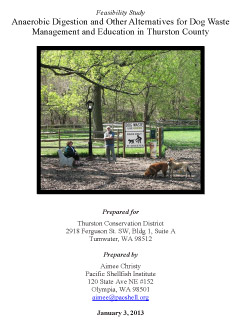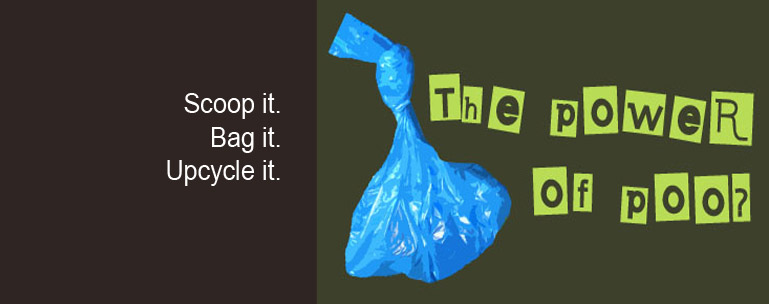|
Would you be better about cleaning up after your dog if the droppings were turned into valuable commodities such as bioenergy and/or compost? Would you clean your backyard more frequently if you had Curbside Poo Pick-Up? PSI is currently investigating alternatives strategies to pet waste disposal that go hand-in-hand with the current mantra: "Scoop It, Bag It, Trash It."
Dogs generate a large volume of waste in Thurston County. Animal Services estimates that there are 50,000 dogs in Thurston County producing approximately 11 tons of waste per day. While the current pet waste management system protects human health and Puget Sound water quality, it contributes both organic waste and plastic bags to the landfill.
PSI recently completed a feasibility study that examines the potential of establishing an anaerobic digester for dog waste at Hawk's Prairie Off-leash Area in Thurston County. The digester would "green" the park by reducing over 15,000 pounds of dog waste and associated plastic bags to the landfill each year and "upcycling" the waste into bioenergy and compost. The report also explores large scale solutions to pet waste management including the procurement of high volumes of dog waste, municipal and/or regulated composting, and centralized anaerobic digestion. Installation of a demonstration digester at a local dog park would serve to educate the public about the importance of cleaning up after dogs while paving the way towards the adoption of broader sustainable solutions in the future.
To learn more about the power of poo, read the complete feasibility study, "Anaerobic Digestion and Other Alternatives for Dog Waste Management and Education in Thurston County" or contact:
Aimee Christy
Pacific Shellfish Institute
Tel. 360-754-2741
aimee@pacshell.org
|
|
|
FEASIBILITY STUDY:
Anaerobic digestion in South Puget Sound
|
|

This report reviews four case studies of anaerobic experiments for dog waste in the U.S. and abroad. It also examines needs and considerations for establishing a digester at a local dog park, including team selection, monitoring and maintenance requirements, unit selection and outreach.
|
|









